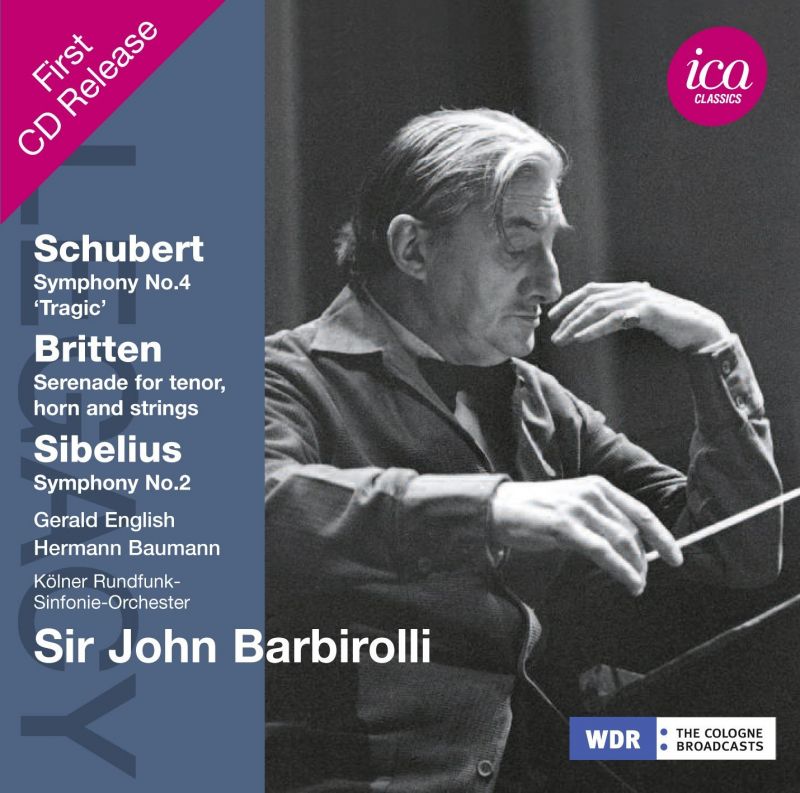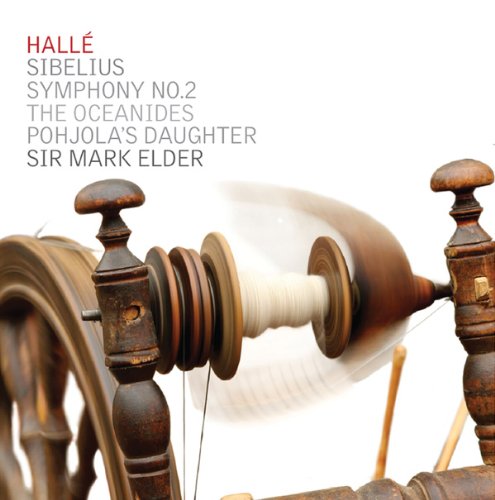SIBELIUS Symphony No 2
Barbirolli’s Cologne Sibelius Second and new fruits from his old Hallé orchestra
View record and artist detailsRecord and Artist Details
Composer or Director: Benjamin Britten, Franz Schubert, Jean Sibelius
Genre:
Orchestral
Label: ICA Classics
Magazine Review Date: 08/2013
Media Format: CD or Download
Media Runtime: 99
Mastering:
DDD
Catalogue Number: ICAC5096

Tracks:
| Composition | Artist Credit |
|---|---|
| Symphony No. 4, 'Tragic' |
Franz Schubert, Composer
Franz Schubert, Composer John Barbirolli, Conductor WDR Symphony Orchestra |
| Serenade |
Benjamin Britten, Composer
Benjamin Britten, Composer Gerald English, Tenor Hermann Baumann, Horn John Barbirolli, Conductor WDR Symphony Orchestra |
| Symphony No. 2 |
Jean Sibelius, Composer
Jean Sibelius, Composer John Barbirolli, Conductor WDR Symphony Orchestra |
Composer or Director: Jean Sibelius
Genre:
Orchestral
Label: Hallé
Magazine Review Date: 08/2013
Media Format: CD or Download
Media Runtime: 70
Mastering:
DDD
Catalogue Number: CDHLL7516

Tracks:
| Composition | Artist Credit |
|---|---|
| Pohjola's Daughter |
Jean Sibelius, Composer
Hallé Orchestra Jean Sibelius, Composer Mark Elder, Conductor |
| (The) Oceanides |
Jean Sibelius, Composer
Hallé Orchestra Jean Sibelius, Composer Mark Elder, Conductor |
| Symphony No. 2 |
Jean Sibelius, Composer
Hallé Orchestra Jean Sibelius, Composer Mark Elder, Conductor |
Author: Rob Cowan
The remainder of the concert is satisfying but occasionally flawed. In the opening Adagio molto of Schubert’s Tragic Symphony, the first note of the strings’ first motif falls marginally off the beat, though the rest of the performance is beefy, purposeful and tenderly expressive. The Sibelius Second sounds quite different to its nearest Barbirolli rival, chronologically speaking, the 1966 EMI Hallé recording, where the woodwinds are more forwardly placed and the engineering is positively panoramic. This Cologne performance, although similar in its girth and impact, is less tidy, with the orchestra sounding fazed when they return their machine-gun fire after the solo oboe has marked a temporary truce in the Scherzo. The EMI recording is better, and Sir Mark Elder’s new Hallé version better still. His is a relatively contained view of the piece and although Elder’s total timing for the second movement is very close to Barbirolli’s, the two opening passages are miles apart, Elder swift and mobile so that there’s no need to rush at the first climax, Barbirolli’s a faltering ramble across misty thickets and bracken (though the actual playing is excellent). Osmo Vänskä’s ominous tread and monumental build-up are quite frankly more imposing than either. Elder is at his best in the first movement which, like the two tone-poems, is sensitively pointed and rhythmically supple, but the Andante seems to me to be holding something back, an element of fright perhaps, even near-hysteria such as is found by many other conductors from Beecham, Toscanini, Koussevitzky, Bernstein and indeed Barbirolli (any of four versions) to Davis and Vänskä.
The precision of Elder’s Pohjola’s Daughter, with its carefully tiered dynamics (the low winds/brass and cello opening is beautifully balanced), makes a much stronger impression and so does the hauntingly atmospheric Oceanides, which rises to a powerful climax. In the case of the symphony, the grand denouement is impressive but, in context, unearned: too much has been downplayed en route. It’s an observant performance, well recorded, but, in the digital field, no match for Vänska or Davis on LSO Live.
Discover the world's largest classical music catalogue with Presto Music.

Gramophone Digital Club
- Digital Edition
- Digital Archive
- Reviews Database
- Full website access
From £8.75 / month
Subscribe
Gramophone Full Club
- Print Edition
- Digital Edition
- Digital Archive
- Reviews Database
- Full website access
From £11.00 / month
Subscribe
If you are a library, university or other organisation that would be interested in an institutional subscription to Gramophone please click here for further information.




